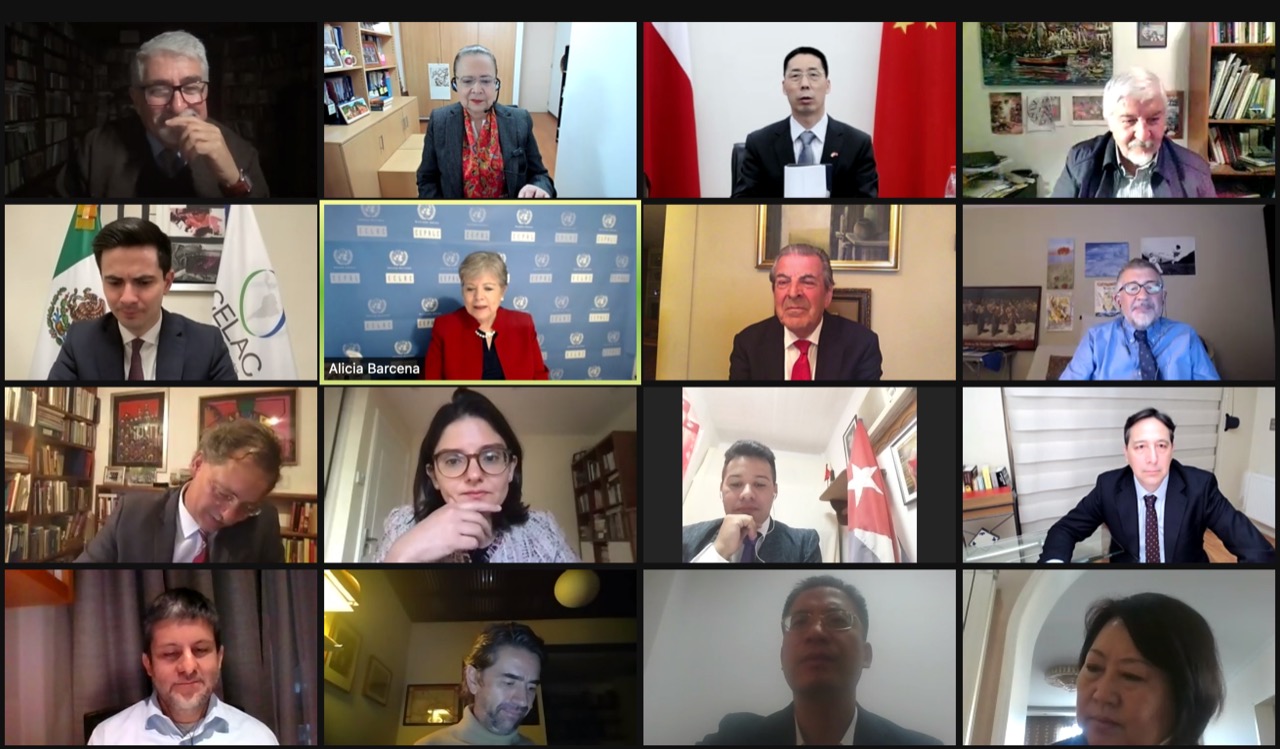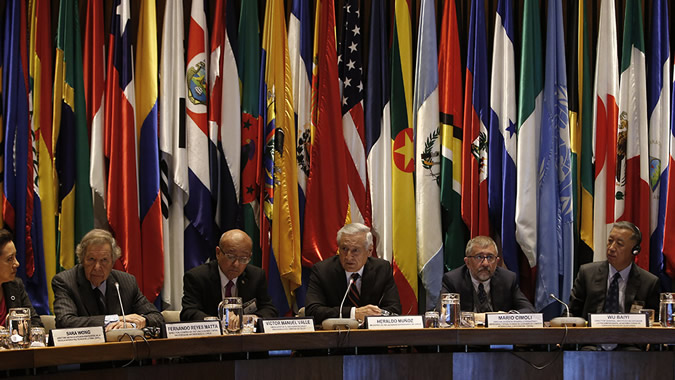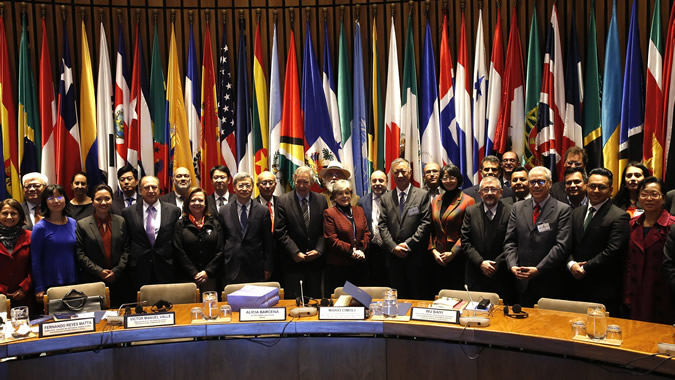Second CELAC-China Academic Forum Seeks to Strengthen Cooperation between Both to Tackle New Global Challenges
ECLAC Executive Secretary Alicia Bárcena opened the event, which includes the VI China-LAC Think Tanks Forum, jointly with authorities and distinguished academics.

The Executive Secretary of the Economic Commission for Latin America and the Caribbean (ECLAC), Alicia Bárcena, along with authorities, former heads-of-state and distinguished academics, opened the II High-Level CELAC-China Academic Forum and the VI China-LAC Think Tanks Forum. The two-day event will bring together government officials, university experts and international officials from both regions with the aim of exchanging experiences and promoting mutual cooperation to tackle new global challenges and build forward a better future.
With sponsorship from Mexico’s Secretariat of Foreign Affairs (SRE) and the Chinese Ministry of Foreign Affairs, the event is co-organized by CEPAL with the Latin American Institute and the Bureau of International Cooperation of the Chinese Academy of Social Sciences (CASS), the Chinese People’s Institute of Foreign Affairs, the Chinese Institute of International Studies, the China Foundation for International Studies and the Association of Universities of Latin America and the Caribbean (UDUAL).
In her remarks in the opening session, Alicia Bárcena underscored that China is a natural partner for the Community of Latin American and Caribbean States (CELAC) – currently presided by the Government of Mexico – and since the establishment of the China-CELAC Forum in 2014, relations between the region and China have become increasingly closer.
“This Forum is a key component of the China-CELAC Forum in that it promotes the exchange of ideas and strategies for bringing our regions closer. In 2017 ECLAC had the honor of hosting the I High-Level CELAC-China Academic Forum and the VI China-LAC Think Tanks Forum at our headquarters in Santiago, Chile. Just as that first Forum brought significant intellectual support to the Second Meeting of Foreign Ministers of the CELAC-China Forum, we expect another successful encounter among intellectual leaders from China and Latin America and the Caribbean in anticipation of the Third Ministerial Meeting of the China-CELAC Forum,” she explained.
The senior United Nations official pointed out that Latin America and the Caribbean has been one of the regions hit hardest by the COVID-19 pandemic, both in terms of the number of cases and deaths, as well as in economic terms, given that it had the worst performance in 2020 of all developing regions, with a GDP contraction of 6.8%, the largest since 1900. As a result, poverty and inequality have drastically increased.
“Despite this challenging panorama, the region’s relationship with China has been a positive aspect. China is now the second trade partner in the region and the leading trade partner in South America. In 2020 China was the only significant market in which exports from Latin America and the Caribbean registered an increase. Exports from the region to China grew by 2% in comparison with a drop in total exports of 13%. China is also an increasingly important investor in the region,” she indicated.
Bárcena remarked that, considering that the region is facing an enormous need for investment to back its recovery from the pandemic, China is well-positioned to drive growth in existing and emerging sectors, and to promote new capacities as one of the largest foreign investors in the world. “One of these key areas is medicines and vaccines. Of the 946 million doses of COVID-19 vaccines that China has provided to the world, 241 million were delivered in Latin America and the Caribbean,” she underlined.
She also emphasized the urgency of moving forward on regional integration to tackle these challenges and the fact that the pandemic has opened up an opportunity, particularly when it comes to vaccines.
ECLAC’s Executive Secretary recalled that during the IV Summit of CELAC Heads of State and Government – held on September 18 – ECLAC released the document Plan for self-sufficiency and health matters in Latin America and the Caribbean: Lines of action and proposals, which the countries approved unanimously. “We encourage China to join us in this effort that seeks to reinforce health security in the region,” said Alicia Bárcena.
Bárcena highlighted that over the next two days, this academic Forum will explore how China and Latin America and the Caribbean can shore up their already robust ties through mutual learning and cooperation. She indicated that the sessions on mutual learning about development; cooperation between China and Latin America under the One Belt One Road Initiative – Alicia Bárcena sits on its advisory board – and other emerging areas of cooperation between China and Latin America to explore in this forum, such as the topic of vaccines, technological and scientific innovation, the digital economy, the energy transition within the framework of sustainable development, and climate action; and cooperation between China and Latin America with a view toward the future, all make for a platform to serve as an intellectual backdrop for the upcoming III Ministerial Meeting of the China-CELAC Forum.
“As President Xi Jinping stated during the VI CELAC Summit, ‘The ties between China and the region have entered a new era characterized by equality, mutual benefit, innovation, openness and the wellbeing of our people.’ I am sure that this Forum will help to forge a path toward deeper cooperation between China and Latin America and the Caribbean in the current international panorama,” said Alicia Bárcena in her final remarks.
The opening session was moderated by Liao Fan, Deputy Director-General of the CASS Bureau of International Cooperation, with remarks by Wang Linggui, CASS Vice-President; Qui Xiaogi, Special Representative of the Government of China for Latin American Affairs; Eduardo Frui Ruiz-Tagle, former President of the Republic of Chile; Bruce Golding, former Prime Minister of Jamaica; Alicia Bárcena, Executive Secretary of ECLAC; Efaín Guadarrama, General Director of American Regional Organizations and Mechanisms, Mexican Secretariat of Foreign Affairs; and Roberto Escalante Semerena, Secretary-General of the Association of Universities and Institutions of Higher Education of Latin America and the Caribbean (UDUAL).
Related content

Opportunities for Cooperation between China and Latin America and the Caribbean Are Underscored in Academic Forum at ECLAC
The First CELAC-China High-level Academic Forum was inaugurated at the organization’s headquarters in Santiago and attended by Chilean Foreign Minister Heraldo Muñoz.

China and Latin America and the Caribbean Must Advance Together Toward the Digital Revolution, the Green Economy, Job Creation and the Fight against Inequality: ECLAC
The organization’s Executive Secretary, Alicia Bárcena, spoke at the conclusion of the debates of the First CELAC-China High-level Academic Forum, which was held in Santiago, Chile.
Type
Country(ies)
-
China
- Latin America and the Caribbean
Contact
Public Information Unit
- prensa@cepal.org
- (56 2) 2210 2040